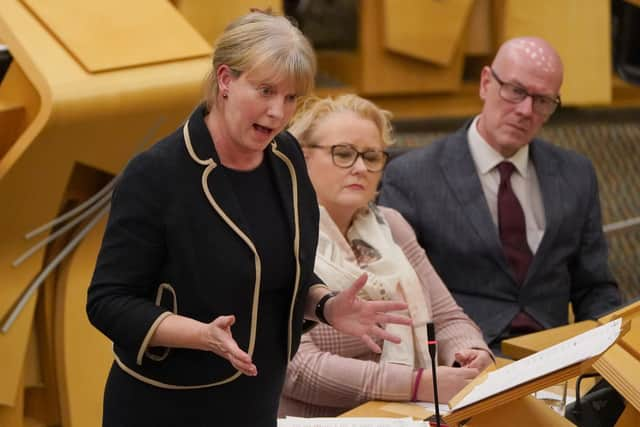Old enemies unite in fury against UK Government blocking Scotland's gender reform bill
This article contains affiliate links. We may earn a small commission on items purchased through this article, but that does not affect our editorial judgement.
Scottish secretary Alister Jack announced earlier on Tuesday that he would use section 35 of the Scotland Act to prevent the Gender Recognition Reform Act from gaining royal assent – the first time such powers have been used since Holyrood was established in 1999.
The move sparked fury among MSPs across different parties in the Holyrood chamber who, during an urgent question secured by Scottish Labour MSP Monica Lennon, attacked the UK Government’s stance, with constitutional differences around independence set aside.
Advertisement
Hide AdAdvertisement
Hide AdMs Lennon, a left-wing member of Labour and a former leadership challenger of Anas Sarwar, accused the UK Government of “hiding behind legal advice”. In a marked departure from her party’s official equal criticism of the SNP and Conservatives, she labelled the UK Government a “bad actor in this process”.
“[The Bill] is about dignity, fairness and equality for a marginalised group of trans citizens,” she said.
“The Secretary of State may hide behind legal advice, but the truth is the Tories at Westminster have proven that they are no friends to trans people and as the architects of the ‘rape clause’ we know they are no friends to women and girls. It’s a direct attack on self-ID for trans people, but also on Scottish devolution.”
Shona Robison, the social justice secretary, said the decision was a “dark day for trans rights and a dark day for democracy”. She questioned the suggestion there was a Bill that would be acceptable to the UK Government and legally competent.
The SNP figure also accused the UK Government of blocking the Bill for political, not legal reasons.


“It does not agree with the Bill, so they have blocked it,” she said. “The decision they have taken is political and it is a sad day for democracy and devolution.
"Whether it is the setting aside of the Sewell Convention or other attacks on devolution and the powers of this Parliament and indeed that of Wales, there is clearly a pattern of behaviour here that is there for all to see.
"When we hear one of the defences put forward by the Secretary of State for Scotland that you cannot have divergent systems in the UK, well that does rather question all the other divergent systems that this Parliament has put in place to make the lives of people here in Scotland better, so I think it very much a slippery slope.”
Advertisement
Hide AdAdvertisement
Hide AdThe social justice secretary also accused the UK Government of using section 35 as a “smokescreen”. She said the Scottish Government had “really no option” than to take action, most likely a judicial review.
Pressed on the legal advice received during the Bill’s passage, Ms Robison said “various aspects” had been tested, while the Scottish Government always accepted there would be “some practical issues”.
It is understood that refreshed legal advice around the section 35 order and potential chances of victory has yet to be received by the Scottish Government.
Alex Cole-Hamilton, leader of the Scottish Liberal Democrats who backed the Bill, also attacked the move by the UK Government, saying that “no amendment to the Bill would satisfy the UK Government’s concerns”.
He said: “Does the Cabinet secretary agree with me that the free vote, the division in their own benches would suggest that those legal arguments do not carry any weight at all and that a swift application for judicial review in the Supreme Court will both demonstrate that, offer reassurance to the general public and deliver much needed reform for our trans constituents?”
Even SNP opponents to the bill such as John Mason showed support for the Scottish Government’s position on section 35.
Mr Mason, who has fallen foul of internal party discipline over his policy disagreements, said: “I was opposed to this Bill and I remain opposed to this Bill. However, a democratic decision has been made by this Parliament and does she agree that Westminster is effectively telling Scotland that we are second rate and we should just get back in our box?”
Scottish Labour’s equalities spokesperson Pam Duncan-Glancy pushed the Scottish Government to admit they knew about “potential cross-border issues”, but did not attack the section 35 order.
Advertisement
Hide AdAdvertisement
Hide AdRachael Hamilton, the Scottish Conservative spokesperson on equalities, said the UK Government had offered to work with the Scottish Government and asked whether the offer would be accepted.
She said: “The Secretary of State has recognised the intention of this Bill is to respect, support and understand the needs of transgender people going through the process of changing their legal sex and has offered to work with the Scottish Government to create a Bill that is legally competent and falls within the devolved powers of this Scottish Parliament.”
However, Scottish Green MSPs Gillian Mackay and Maggie Chapman accused the UK Government of using blocking the Bill as a distraction and a deliberate stoking of a “cruel” culture war.
Want to hear more from The Scotsman's politics team? Check out the latest episode of our political podcast, The Steamie.
It's available wherever you get your podcasts, including Apple Podcasts and Spotify.
Comments
Want to join the conversation? Please or to comment on this article.
